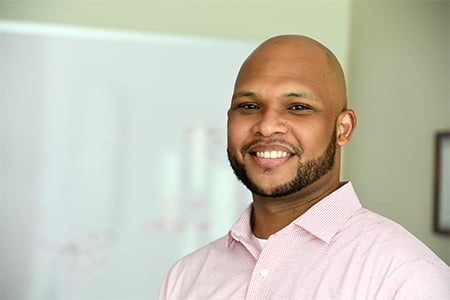Aging happens to everyone. As birthdays come and go, we anticipate more gray hairs on our heads, wrinkles on our faces, and aches in our bodies. But there are other factors that influence aging than the number of birthdays that pass, such as genetics and socioeconomic status. And to Jude Phillip, looking at aging at the cellular level can help reveal insights about the onset of diseases.
“When you look at aging, you are essentially looking at a key risk factor for diseases. We all age, so we all feel the effects,” said Phillip.
Phillip is joining the Johns Hopkins Department of Biomedical Engineering as one of its newest core faculty members, and he will be welcomed by some familiar faces. He is returning to the school where his interest in aging began as he pursued his PhD studies under the mentorship Denis Wirtz, Theophilus Halley Smoot Professor in the Department of Chemical and Biomolecular Engineering, vice provost for research at Johns Hopkins University, and co-founder and core faculty member at the Institute for NanoBioTechnology.
Naming his laboratory, the Phillip (tiME)n Lab, Phillip’s research will focus on cells through the passage of time. His key focus is to identify cell-based biomarkers of aging. By doing this, he can better understand how to target and delay aging’s harmful effects. Not only that, Phillip will focus on aging as it applies to cancer. He believes that studying aging at the cellular level provides a unique perspective as cells are a bridge between what is happening at a molecular level and the full effect it has on the body.
“Cells can become dysfunctional based, in part, by molecular defects, and then these propagated dysfunctions manifest as diseases. By looking at cells, we are trying to identify a lead time so that we can treat the problems before the disease manifests,” said Phillip.
Born and raised in Grenada, Phillip came to the United States at 17 years old to pursue his undergraduate degree in chemical engineering at the City College of New York. Since completing his biomedical engineering PhD work in 2015, Phillip has been conducting postdoctoral research on lymphoma at Weil Cornell Medicine with Leandro Cerchietti, associate professor of medicine, and Ari Melnick, professor of medicine.
As Phillip sets his roots at Johns Hopkins, he is looking to build a laboratory that is both interdisciplinary with students and collaborators studying engineering, biology, immunology, and also culturally and ethnically diverse. He is interested in partnering with after-school programs for middle and high school students to inspire young children to consider science as a career. Motivated by an experience he had a few years ago, Phillip sat on a panel with other STEM professionals to talk and answer questions from middle school students about science career paths.
“The room was filled with mostly Black and Latino students, and a little girl asked me a question that began, ‘If I can be an engineer.’ I was struck that she was asking if she could be an engineer rather than asking how she could be an engineer. She was asking the wrong question without knowing she was asking the wrong question, but this goes to show the great responsibility that rests upon our shoulders,” said Phillip.
Phillip will be a core faculty member at The Institute for NanoBioTechnology (INBT), hold a primary appointment in the Department of Biomedical Engineering, and a secondary appointment in the Department of Chemical and Biomolecular Engineering.
– Gina Wadas

